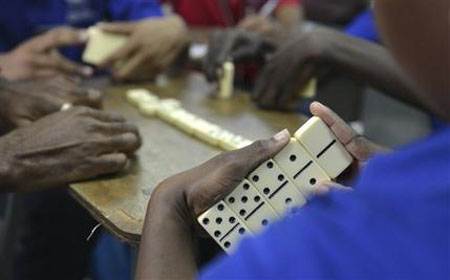
In this Oct. 31, 2013 photo, vocational students learn domino strategies in a classroom in Kingston, Jamaica. A government program is teaching domino strategies to inner-city young adults from gang-steeped areas. (AP Photo / David McFadden)
KINGSTON, Jamaica (AP) — Students from some of the toughest neighborhoods in Jamaica’s capital hunched over school desks, clacking wooden dominoes, pausing to ponder their next move and razzing opponents with good-natured taunts.
“Look out, here comes the end of the game! Nobody can stop it,” said 20-year-old Chevon Brown as he boisterously slammed down a dotted tile, or “bone,” and grinned.
These young men and women aren’t just killing time. A government program is teaching domino strategies to inner-city teens and 20-somethings from gang-steeped areas in the hopes it will keep them from becoming crime statistics or give in to despair at a time when youth unemployment stands at 38 percent and good opportunities are scarce.
Call it Jamaica’s domino effect: At-risk youngsters are learning to view life through the lens of the deceptively simple game. Under the guidance of a Justice Ministry officer who devised the “Dominoes for Life” program, participants say the game is helping them work through possible outcomes and develop thinking skills as they learn how to better connect the dots in the real world.
“Life is a game, just like the domino game. It’s teaching us to have patience and strategize in our own lives to get past all the blocks and barriers facing us,” said student Carlington Pryce of Denham Town, a West Kingston slum where police curfews are frequent and many young men get shot, locked up or overlooked.
The centuries-old game is deeply woven into the cultural fabric of the Caribbean, from the beaches of Barbados to the plazas of Puerto Rico. In Jamaica, it’s almost an obsession for many players, who can be seen each evening slamming domino tiles on card tables on street corners or outside rum bars in cities and rural towns. The style of play is loud and dominated by men. The government officially recognizes competitive dominoes as a sport.
The National Association of Domino Bodies, which regulates the game on the tropical island of 2.7 million people, is also teaching it in schools to improve youngsters’ self-esteem. On the group’s website, the domino diehards assert the brain game can even awaken social awareness, improve morals and boost community pride.
Association Vice President Humbert Davis, who learned dominoes from his father decades ago, said struggling youngsters are riding their game tutorials to academic success. Hundreds of players between the ages of 6 and 18 attend the association’s three-week long camps.
One of the association’s young acolytes is Shavoine Lewis, a slender 16-year-old from the Kingston community of Halfway Tree. “Dominoes is giving me the focus to do better in all my subjects,” he said as he watched a group of adult players get ready for a recent league competition in the rural community of Constitution Hill, some stretching like athletes, raising their arms above their heads or jumping in place.
In straight dominoes or the “double-six” game played competitively in Jamaica, two-player teams take turns trying to match the number of dots, or “pips,” on their pieces with those on the table. The first team to get rid of all its tiles wins. Top players memorize every tile that hits the table and analyze probabilities to figure out who is holding which piece.
Marcia Flynn, the architect of the government’s domino program, believes it’s the perfect tool to teach life lessons. She ticks off nuggets of domino wisdom to her students: The choices people make in life will largely decide whether they win or lose, just like in dominoes. Partners must be chosen carefully, in the real world and in the game. Starting out with an apparently weak hand can result in success.
To Jamaicans from struggling inner-city neighborhoods, where many residents feel the odds are stacked against them, these are resonant messages.
“Some of you used to be on the corners doing nothing, right?” Flynn asked a classroom of vocational students on a recent day. “The opportunity came to study and you made a move forward, just like with the domino game. You are moving ahead with your life and you have to keep your eyes looking forward to see how it will play out. You have to play smart to the end.”
Still, some say benefits of the game go only so far when work is in such short supply.
“Teaching the domino game is good ’cause there’s too much negativity. But jobs is what we really need in Jamaica,” said struggling laborer Chris Shay outside a market in gritty West Kingston.